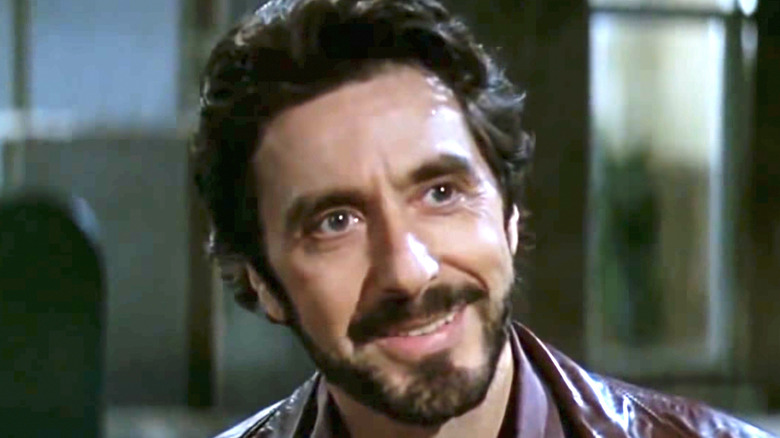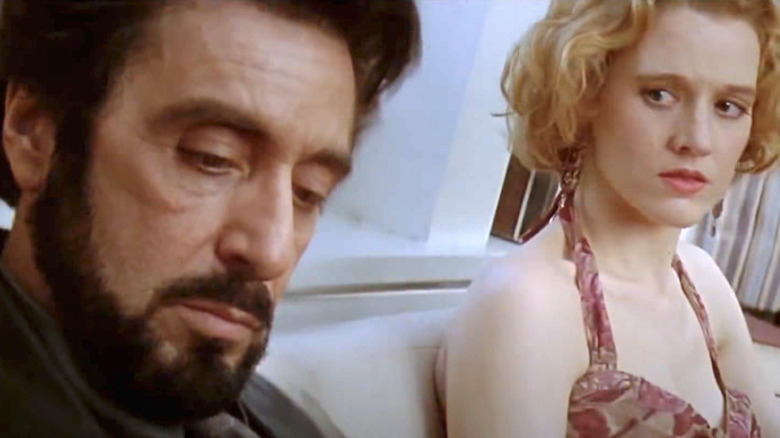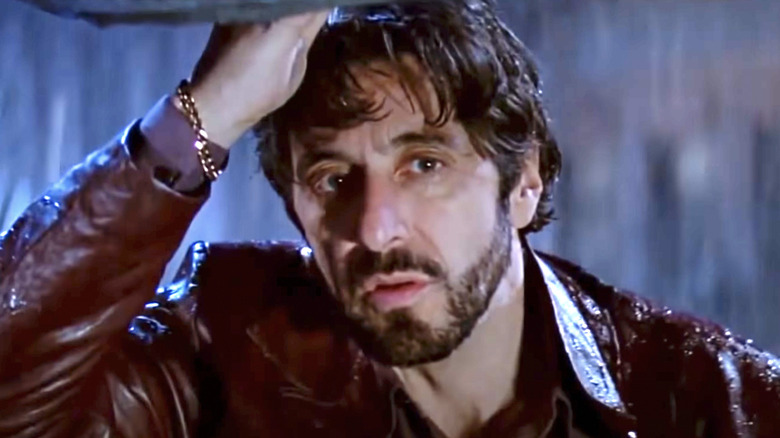The Ending Of Carlito's Way Explained
Brian De Palma's 1993 crime epic "Carlito's Way," starring Al Pacino, might not be the pop-cultural touchstone that the duo's earlier film "Scarface" is, but it's an excellent film in its own right. A kind of mirror-image to the acidic "Scarface," "Carlito's Way" is more sentimental, more romantic, and at times even more exciting, and it features a terrific lead performance from Pacino as would-be reformed criminal Carlito Brigante, as well as supporting turns from Penelope Ann Miller, Sean Penn, John Leguizamo, Viggo Mortensen, and Luis Guzmán.
Structurally, "Carlito's Way" gives viewers a look at its ending right off the bat, as the bulk of the film takes place in a lengthy flashback as Carlito is wheeled on a stretcher to a hospital he'll never see. But it's easy to forget this fact as you get swept away by the movie's compelling narrative, and when the ending comes around again, you might find yourself completely surprised by it.
Carlito's Way ends on a tragic note
The last act of "Carlito's Way" is one of the finest sequences of Brian De Palma's career. The filmmaker, known for creating suspenseful moments in movies like "Blow Out," "The Untouchables," "Body Double," and "Mission: Impossible," brings serious cinematic heat to Carlito's attempts to evade the Italian mobsters he brings down on his head.
The mobsters show up at his club to avenge the death of one of their own (a person who is actually killed by Carlito's loose-cannon lawyer Kleinfeld, played by Sean Penn), and the chase is on through New York City's Grand Central Station. There is simply no way to do justice to this sequence in words, but suffice it to say that he manages to escape his pursuers and make his way to the train platform, where his oft-suffering, pregnant girlfriend Gail (Penelope Ann Miller) is waiting for him.
The couple is planning to take the last train to Miami, leaving NYC and the criminal lifestyle behind for good. But then, seemingly out of nowhere, the fateful bullet that we see striking Carlito in the film's opening appears again. In a cruel, ironic twist of fate, the bullet isn't fired by any of the mobsters that Carlito has been running from, but by "Benny Blanco from the Bronx" (John Leguizamo), a flashy young gangster whom Carlito disrespects and throws down a flight of stairs earlier in the movie.
It's revealed that Benny finds Carlito through his trusted associate Pachanga (Luis Guzmán), in an act of betrayal. Thus ends one of the most underrated crime dramas of the 1990s — and the sad saga of Carlito.
Despite failing to escape, Carlito seems to be at peace
Both 1983's "Scarface" and 1993's "Carlito's Way" are in a sort of thematic conversation with one another, which becomes especially prominent when you contrast the characters of Tony Montana and Carlito Brigante — both played by Al Pacino. While they initially appear to have similar stories, the way each character's tale ends showcases a stark difference in their overall morals and goals.
Everyone remembers how Tony dies in a violent, cocaine-fueled blaze of bullets, a victim of his own hubris. Carlito, on the other hand, is only guilty of being loyal to his associates, who take shameless advantage of him for their own ends. He tries to do the right thing — go legit, save up his money and leave the criminal underworld behind — but his past and his reputation as a criminal simply will not let him. While Tony needs to be brought down by extreme, chaotic violence, Carlito seems almost at peace when he is finally taken down by a quick shot to the stomach, calmly accepting his fate. But why is Carlito so accepting? One explanation is that he is older and wiser than Tony, with a better perspective on life and death.
Another more obvious explanation is locked in what ends up being the final image to cross over Carlito's eyes (in a Brian De Palma film, looking is always the most significant thing a character can do): a billboard for sunny, coastal Florida, where he imagines Gail (Penelope Ann Miller) escaping with the money he earned, and being free of his entanglements and baggage. Although he doesn't get to join her, he's happy knowing that she can live a good life. In this way, even though the ending of "Carlito's Way" is undeniably tragic (and a real tearjerker), there is also a note of hope and optimism in Carlito's final moments.


